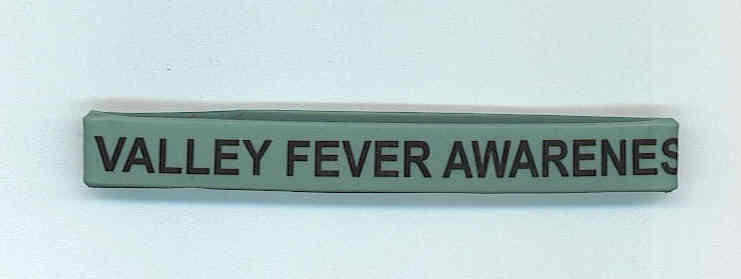
On Sale for $3 each plus shipping
To order Contact Linda at coccifever@cox.net

Coccidioidomycosis is an infectious disease caused by inhaling spores of a fungus called Coccidioides . The disease starts out as a respiratory illness and may progress to a persistent infection. Disseminated coccidioidomycosis is the most severe form of the disease and is often fatal.
Who gets coccidioidomycosis?
Anyone who is present near dust-producing activities where soil or other materials contaminated with C. immitis are present can get coccidioidomycosis if enough spores are inhaled. People of African or Asian descent, pregnant women and people who are immunocompromised are at increased risk for developing Disseminated coccidioidomycosis.
C. immitis grows in arid (dry) and semiarid areas of the Western Hemisphere. In the United States, this range extends from California to southern Texas, and includes parts of Utah.
How is coccidioidomycosis spread?
Coccidioidomycosis is not contagious; it cannot be transmitted from an infected person or animal to someone else. People are infected with C. immitis when they inhale spores. Dusty objects from areas where C. immitis is common may contain infective fungal spores.
What are the symptoms of coccidioidomycosis?
Coccidioidomycosis first infects a person's lungs. The primary disease may produce no symptoms at all or may produce a fever, chills, and cough. This infection may heal completely, or result in other complications.
One complication of this infection is called erythema nodosum. This occurs most commonly in Caucasian females and can be diagnosed by a physician. Another complication of this infection is permanent damage to the lung.
Approximately one out of a thousand cases of coccicioidomycosis will progress to disseminated coccidioidomycosis, which is the most severe form of the disease. People with disseminated disease form lesions in the lung and abscesses throughout the body. These abscesses tend to form in the subcutaneous tissues, skin, bone and the central nervous system (the brain and spinal cord).
How soon after exposure do symptoms appear?
Symptoms of disease usually start within one to four weeks after exposure. Disseminated disease may develop years after the primary infection (even when the primary infection was so mild that the patient does not remember having it).
How is coccidioidomycosis diagnosed?
The diagnosis of coccicioidomycosis is made by finding the fungus in the patient's sputum, pus, urine, cerebrospinal fluid, or in biopsies of skin lesions or affected organs. A diagnosis may also be made using skin tests or blood tests.
What is the treatment for coccidioidomycosis?
Mild cases of coccidioidomycosis usually resolve without treatment. For severe cases, anti fungal medications are needed. Disseminated coccidioidomycosis is fatal if untreated, but death can also occur in some patients even when medical treatment is received.
How can coccidioidomycosis be prevented?
The best way to prevent exposures to C. immitis spores is to avoid situations where soil that might be contaminated can be inhaled.
If materials that are potentially contaminated must be removed, contact your local health department for
specific advice on how to protect yourself.
